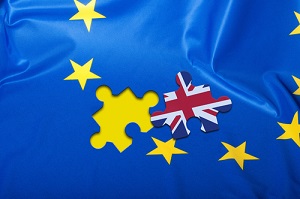Global stock markets are rallying today (Monday) following news about the upcoming Brexit vote on Thursday, June 23. The latest Brexit polls today suggest UK voters may choose to remain part of the European Union.
While that's the biggest news of the day, there is much more investors need to know about this week's Brexit vote. That's why we've compiled a list of the top five must-know Brexit details.
But before we get into the list of Brexit facts, here's more about today's Brexit poll...

A survey published Sunday in UK's The Mail showed 45% of respondents backed the UK staying in the trade bloc, compared with 42% in favor of leaving. The poll-of-polls, averaging the last six polls in the June 23 Brexit vote, returned to 50/50. That signaled growing momentum for the "remain camp" in the EU referendum.
Stocks around the world breathed a sigh of relief Monday following the news...
The Stoxx Europe 600 surged 3.5% in morning trading. By the close, the index logged its best day since August. The British pound soared 2% against the dollar to $1.464.
U.S. stocks also rallied. Just before noon, the Dow was up 230 points, or 1.3%. The S&P 500 and Nasdaq also rallied, up 1.25% and 1.66%, respectively.
Over the last several sessions, the chance of a Brexit sent stocks lower around the world. Bond yields sank to record lows last week as investors feared a Brexit could spark a lengthy period of uncertainty, curbing growth and trade in the world's fifth-largest economy.
Those against the Brexit say leaving the EU would rattle global markets, disrupt trade, and severely damage the UK economy.
Meanwhile, Brexit proponents argue Britain will be better off in the long run outside the EU. They believe in full sovereignty and unconstrained control over immigration and economic regulations.
With the Brexit vote just days away and the outcome still uncertain, here are five must-know facts for investors, including what a Brexit would mean for your money...
Brexit Vote: 5 Facts Investors Need to Know Now
[mmpazkzone name="in-story" network="9794" site="307044" id="137008" type="4"]
- Great Britain's exit from the European Union will begin a process that could cost the EU one of its largest and wealthiest members. Unraveling the UK's deeply entrenched relationships with member nations will be highly disruptive and costly. The 2008 financial crisis and ongoing Syrian refuge crisis have already strained the EU's wobbly political and economic institution. A British departure would further shake confidence that the EU can exist long term. It will also prompt other EU member countries to consider exits.
- A Brexit vote would likely prompt other anti-EU parties in other countries to renegotiate their relationship with the European Union. That would create what global market researcher FIS Group refers to as an "exit contagion." They say that could send British stocks sinking 20%, European stocks plunging 15%, and U.S. stocks slipping 10%. Volatility in British and European markets would double. Volatility in the U.S. market would soar 60%. That would make markets a very rocky place for investors for the remainder of the year.
- A Brexit will be costly for banks, since London has become Europe's financial center. Banking analysts have already calculated that Brexit would be another financial headwind for big banks such as JP Morgan Chase & Co. (NYSE: JPM), Goldman Sachs Group Inc. (NYSE: GS), and Citigroup Inc. (NYSE: C). The revenue from Big Banks would slump in response to the Brexit turmoil and the transition. Their costs would climb as they would have to relocate and lay off personnel.
- The anticipated burst of currencies trades in the event of Brexit will test banks' ability to process transactions. This would come at a time when most have seriously slashed trading staff. The number of traders employed at major banks has declined 22% since 2010, according to research consultancy Coalition. Some fear a Brexit will ignite the kind of volatility that shook global markets in January 2015, when the Swiss National Bank abandoned its venerable cap on the franc. The currency jumped nearly 30% against the euro in the minute following the decision. The result was huge losses for banks, brokers, and individual investors. A frenzied rush to unwind trades in the event of a Brexit falling through will also be trying for traders.
- S&P 500 companies generate just 2.9% of their sales from the UK, according to FactSet. While that's slim, it's the potential ripple effects and unknowns that are so troubling. The most exposed to Brexit is Ireland. In 2014, 38% of Ireland's imports came from the UK, while 15% of exports went to the UK, according to Eurostat.
Keep checking back for Money Morning updates up to and following Thursday's crucial Brexit vote.
Follow us on Twitter @moneymorning and like us on Facebook.
Your Money Morning Guide to Investing in Metals: There are very few assets that have held their value longer throughout history than silver and gold. That's why the two metals are universally considered the best safe-haven investments out there. To give you a better understanding of how to participate in the metals market, we developed this guide to show you how to buy gold and silver...
Related Articles:
- Wall Street Journal: Global Stocks Soar After Poll Suggests U.K. Will Remain in EU
- USA Today: Wall Street Stocks Surge as Tide Turns on Brexit Polls
- MarketWatch: Brexit Polls Show Resurgence in 'Remain' Support


